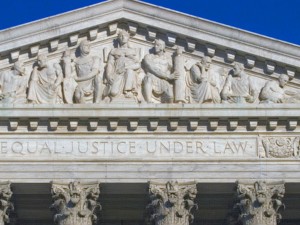July 14, 2013
Any American privileged to visit Washington D.C. cannot help but be impressed and moved by the grandeur and historical significance of numerous edifices in our nation’s capital. Specifically, the stateliness of the White House, Congress and Supreme Court buildings, representing the three branches of our government, are particularly dignified and symbolic. Traveling a few months ago to Washington gave me an opportunity to stand in front of the Supreme Court and utter a silent prayer to God that He would grant wisdom to the justices, as they deliberated over cases in general, but in particular, over those issues which would directly and exclusively affect the lives of LGBT individuals including myself.
The Supreme Court of the United States recently made two very historic decisions both of which will have significant impact upon numerous aspects of the lives of LGBT persons, couples and families. The US Constitution states that judicial power of the country is vested in the Supreme Court. It is the highest court in the country. On the front façade of the Supreme Court building the words “Equal Justice Under Law” are inscribed as the motto of the Court. There are other visual reminders on the building indicating the Court’s main role. The eastern façade of the building bears the words “Justice, the Guardian of Liberty”. Two seated figures “The Authority of Law” and the “Contemplation of Justice” grace the southern and northern sides of the building respectively. There are numerous busts of historic lawgivers, including Moses, Mohammad, Solon, Draco, and others on the building. Each figure reminds us of how justice was fairly, or unfairly, administered under the law.
Tradition dictates that Moses, the Lawgiver, is the author of the book of Deuteronomy, the fifth book of the Bible. Written in the book is one of the most significant verses to Jews: “Hear, O Israel: the Lord, our God, is one Lord” (Deuteronomy 6:4). These words were also uttered by Jesus as recorded in the Gospel of Mark. The majority of the book of Deuteronomy encourages the faithful to observe Jewish law, primary of which is to be obedient to God alone. In the 16th chapter we read the following concerning the importance of justice: “You shall appoint for yourself judges…and they shall judge the people with righteous judgment. You shall not distort justice, you shall not be partial…Justice and only justice, you shall pursue, that you may live and possess the land which the Lord your God is giving you” (Deuteronomy 16:18-20). Justice and only justice, so that you may live!
Justice and equality are rights that we expect, in fact demand, from our government. And although the wheels of justice turn very slowly at times, history has demonstrated that in most areas of equal protection, the court eventually catches up to what is morally right, although not necessarily immediately popular. While the arguments for and against marriage equality will continue for some time, it is also true that the decisions will indeed usher in more examples of commitment and stability for society, as same-sex couples are permitted to legally marry. But ultimately the decisions of the Court were matters of equal justice for gay couples.
For some sincere Orthodox Christians, gay marriage is a concept that is sinful and immoral. But what is morality? In the words of Archbishop Lazar (Puhalo) retired OCA bishop of Ottawa, “true morality consists far more in how well we care for one another than in what kind of external behavior we wish to force on other people…The efforts of some religious bodies to manipulate the civil government in order to have it legislate their doctrines and moral concepts into civil law is nothing else but sinful egoism, self-centeredness and self-love.”
Yet, is justice a matter only for civil society or can we ask for justice in the Orthodox Church? In reading the words of our Lord we search in vain for any utterance that would even hint at a condemnation of gay people. Our Lord spoke about love, forgiveness, hypocrisy, kindness, but did not mention homosexuality. Knowing that our heavenly Father designs each and every person individually, with different eye color and height and other particular characteristics, condemning people for their sexual orientation is as foolish as condemning someone for being left or right handed. If the book of Deuteronomy directs us to pursue justice, can gay people ask for justice from the bishops and priests of the Church? Would fostering an atmosphere in the Church where LGBT individuals could be honest about their orientation and their relationships be justice? Would sermons and Sunday School lessons directed at being kind and respectful to all people regardless of their sexual orientation or marital status be justice? Would permitting gay couples to be married (crowned) in the Orthodox Church be a matter of justice? When a couple is crowned in the Church the verses from Psalm 21 are chanted “You have set upon their heads crowns of precious stones. They asked life of You and You gave it to them” As in Deuteronomy, justice and life are joined. Would not the joining of same-sex couples in the Church bring them life?
Justice is the daughter of love. To love is the commandment of Christ. The Orthodox Church hopefully one day will choose to love, embrace and accept her LGBT children as Christ has already done. Until then, we continue to pray, hope and work for justice in the earthly Church.


Fantastic read! Thank you!
Thank you, Rachel for your kind words.
Blessings of good health and peace to you.